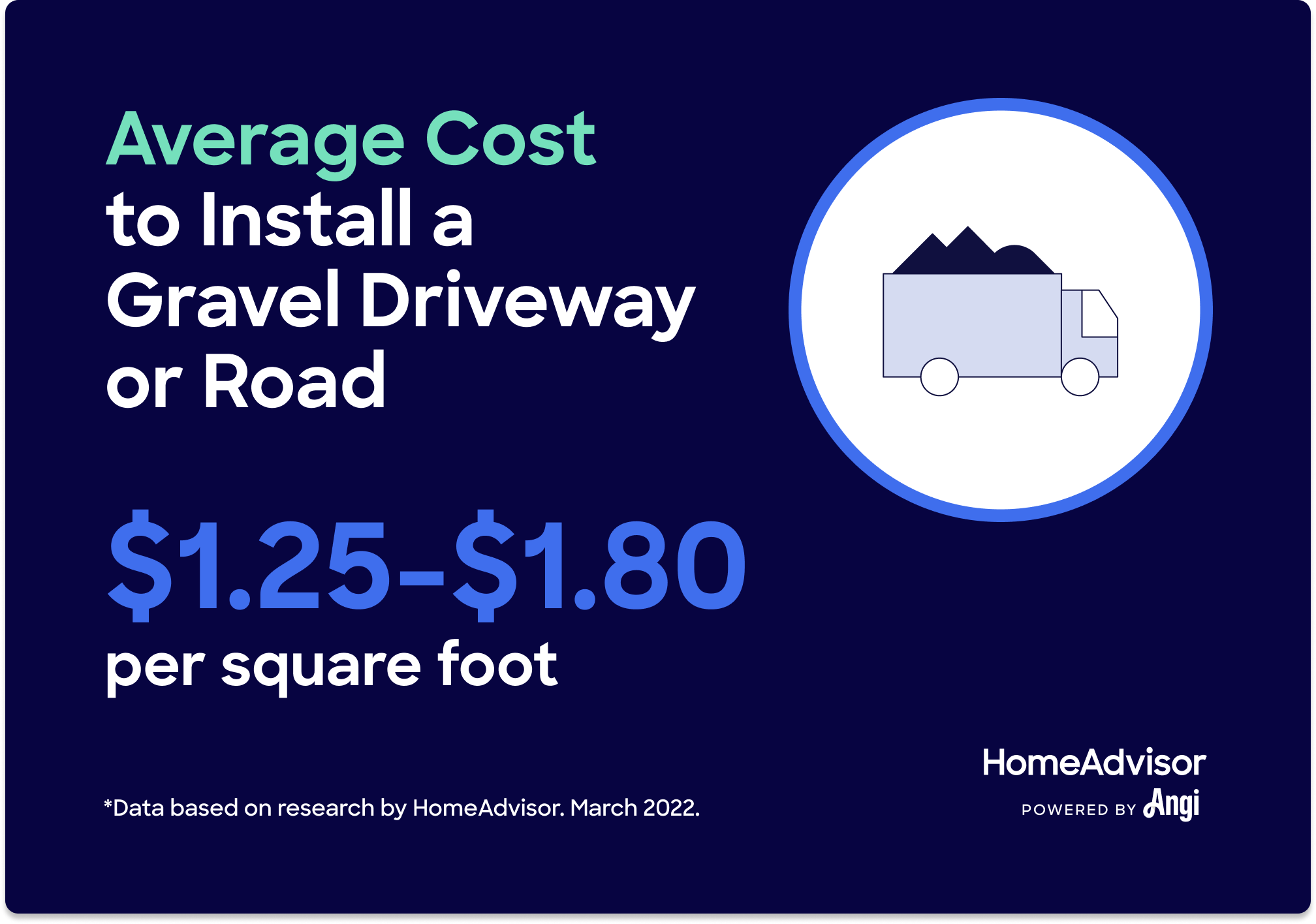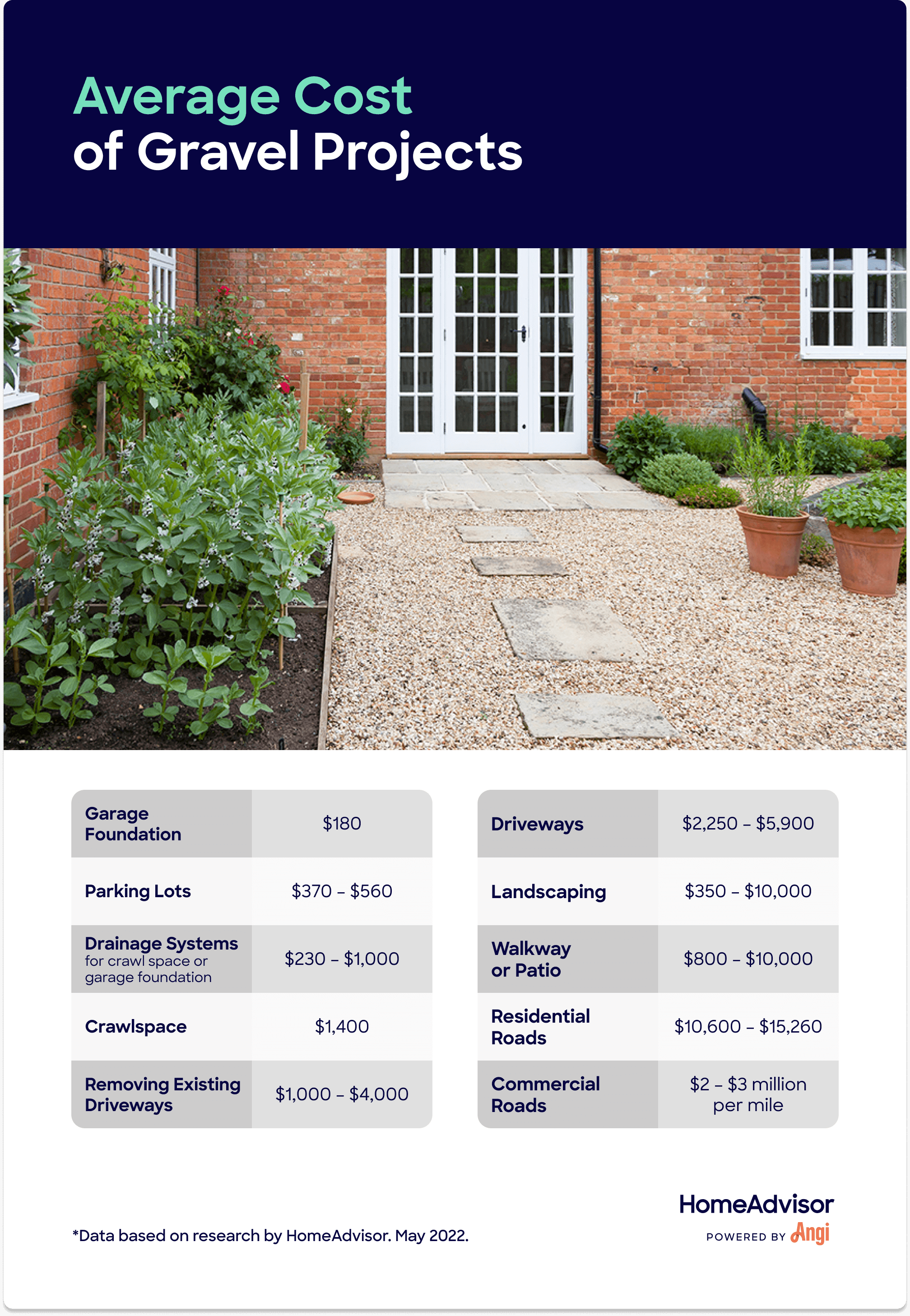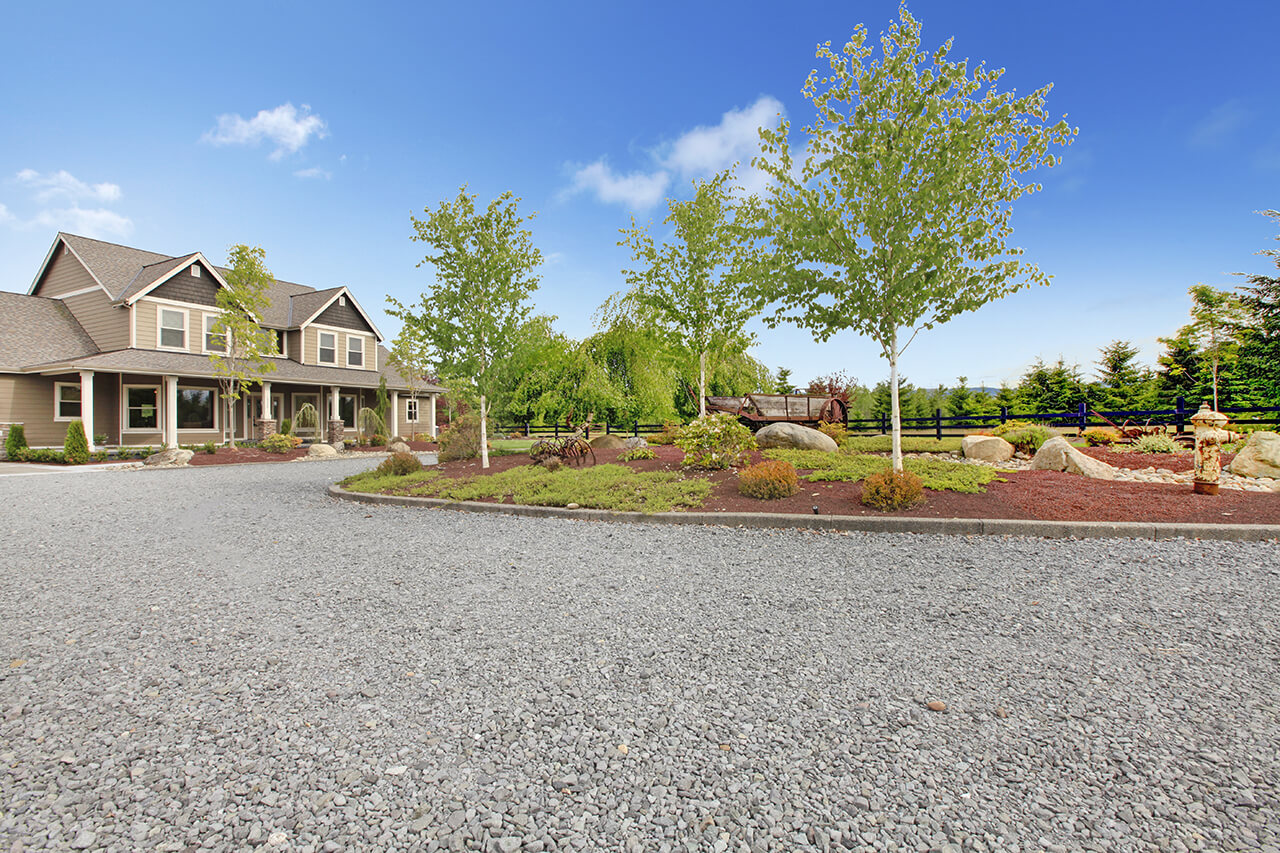How Much Does a Gravel Driveway or Road Cost?
Typical Range:
$300 - $60,000
Typical Range:
$300 - $60,000
Cost data is based on research by HomeAdvisor.
Updated June 1, 2022
Reviewed by Dan DiClerico, Smart Home Strategist and Home Expert.A gravel driveway or road costs $1.25 to $1.80 per square foot. An average 16x28 foot driveway is $1,500. Depending on the size and scope of the project, costs range between $300 to $60,000.
You can use this gravel driveway calculator if you want to skip the math. Or, if you want to do it manually, see the instructions below.
Find the amount of material needed by multiplying the length times the width times the depth. Keep in mind that your driveway may need multiple layers of different types of gravel.
For example, you may have a 16-by-38-foot driveway that you want to top with 4 inches, or 1/3 foot, each of base gravel #3, crush and run, and marble chips. To calculate your material needs, you would multiply 16 x 38 x 0.33 for a total of 201 cubic feet of each material.
If you purchase materials in cubic yards, divide your total by 27 to find your amount of materials needed.
For a driveway that’s 608 square feet, gravel #3 would cost $395, crush and run would cost $240, and marble chips would cost $1,220. Add those three together to get $1,855.
Labor costs $30 per hour, and assuming it only takes two hours, that’ll be an additional $60 for a total of $1,855. The cost might include delivery in the cost of the gravel, but if not, it can cost $5 per mile.
Your gravel driveway prices will vary depending on these key factors. The biggest impact on your project is likely to be the length of the driveway, type of gravel you choose for the different layers, and any major clearing or grading needed on your property.
The type of gravel you choose significantly impacts how much you’ll pay. Keep gravel types in mind if you have a large area to cover; your project total can quickly exceed your ideal budget if you choose a pricier gravel type.
On average, concrete removal costs about $970, with a low end of $250 and a high end of $3,000.
Resloping work costs most homeowners an average of $1,900, with a low end of $400 and a high end of $5,000. Unless your property is totally flat, you can expect to do some resloping work.
Removing trees costs an average of $660, with a low end of $80 and a high end of $1,650.
However, you’ll need to clear your land after having a tree removed. Expect to pay an average of $2,600, with a low end of $450 and a high end of $8,500 in site preparation costs. The price per square foot is $1.30 to $2.
The cost of a drainage system is $2,000 to $5,500. By installing a drainage system, you will ensure that your gravel driveway will last as long as possible.
You may be required to apply for a permit to build your driveway, and you may also be required to pay taxes. These cost $500 to $2,000 per project. Check with your local city or county offices for more information.
A gravel driveway or road costs $1.25 to $1.80 per square foot. An average 2-car driveway is about 16 by 40 feet, or 640 square feet, putting your project at around $800 to $1,150.
If you need to lay down gravel for a private road, it could be as short as a tenth of a mile or even a mile long. For a short private road that’s a tenth of a mile long (about 530 feet) and 16 feet wide, you’re looking at a project that’s 8,480 square feet. That’ll cost $10,600 to $15,260.
The company’s quote may or may not include delivery costs. Some places offer free delivery within a certain range (like free delivery if it’s within 10 miles). Also, you may need to order a minimum amount of gravel for delivery, which can be a cubic yard or even 20 tons. Generally speaking, you should expect to pay $5 per mile for delivery.
The average price of labor is $30 per hour, including the cost of supplies and equipment. The typical driveway job should take two workers about two hours. The total cost to have a professional install a gravel driveway can vary. Some of the factors include the location, size of the project, materials required and whether or not the materials had to be delivered or were already on site.
One of the major factors that will affect your project cost is the types of gravel you choose for your driveway. Most likely, you’ll have either two to three different types of gravel, and the top layer is likely to be the most expensive.
| Materials | Cost Per Square Foot | Cost Per Ton |
|---|---|---|
| Base Gravel | $0.65 | $46 |
| Crushed Stone / Limestone | $30 per square yard | $65 |
| Rock Pebbles | $0.60 | $50 |
| Shells | $0.60 | $50 |
| Crush & Run | $0.40 | $28 |
| Caliche | $0.45 | $32 |
| Steel Slag | $1.30 | $24 |
| Shale | $1 | $20 |
This is the first layer that goes on top of the landscaping fabric and costs $0.65 per square foot, $38 per cubic yard, or $46 for a ton. These rocks are 1 to 2 inches in diameter and irregularly shaped. When packed down, it creates a strong foundation.
This material—also known as crusher run, quarry process, dense grade aggregate, or road stone—is the combination of crushed rock and dust created in the process. It is the most affordable type of gravel on this list and costs $0.40 per square foot, $20 per cubic yard, or $28 per ton. Some find crush and run to be less attractive than other types, and fewer variations are available.
Caliche, a sedimentary rock, is made of hardened calcium carbonate. It's found mostly in arid climates, like states in the Southwest. It costs $0.45 per square foot, $25 per cubic yard, or $32 per ton.
Crushed clamshell is an environmentally-friendly option for your driveway. Shell driveways are consistently stable because the shells break into smaller pieces and disperse as people drive or walk on them. It’s $0.60 per square foot, $40 per cubic yard, or $50 per ton.
Also known as river rocks, these are smooth rocks with many color variations. It’s a naturally stylish option that runs $1.50 per square foot, $86 per cubic yard, or $108 per ton.
This is a higher-quality, highly customizable option. Marble chips fall in this category, and they’re desirable because of their white and sparkling appearance. You can get a better deal if you buy in bulk; you can expect it to cost $30 to $115 per cubic yard or $65 to $143 per ton. Marble chips run $2 per square foot.
Steel slag is a byproduct of making steel. To be used as construction aggregate material, it must be crushed and screened to meet gradation requirements. The aggregate material is angular in shape and rough to the touch. Drier climates work best because steel slag tends to expand in humid environments. It costs $24 per ton.
Crushed shale is a soft, bluish-gray rock that packs down as you walk or drive over it. Over time, the driveway can look like asphalt. It costs $28 to $85 per cubic yard.
The great thing about gravel is that there are so many different ways to use it on your property. Here are some of the most common gravel projects you ought to consider.
"Whether you're putting in a driveway, garden path, or other landscape element, gravel is one of the versatile materials around, combining value with low-maintenance and visual appeal."
Dan DiClerico, HomeAdvisor Smart Home Strategist and Home Expert.
A gravel driveway is generally the least expensive with an average price tag of $1,500. Most homeowners spend between $2,250 and $5,900 to install a gravel driveway. While asphalt and concrete are widely favored, gravel is popular for long driveways, usually found in rural areas.
The size of the project, including the depth, will be the biggest cost factor. Professionals recommend they be a minimum of 4 inches deep. The terrain's flatness, or lack thereof, also will affect the price.
Needing to get rid of an existing driveway can also have a big impact on the cost. Prices vary greatly based on the region but removing an average concrete driveway can cost homeowners $1,000 to $4,000.
Like a driveway, the size of the project has the largest impact on the cost of a residential road. For a residential road a tenth of a mile long, you can expect to pay $10,600 to $15,260—and that’s before covering location-specific building permit costs, which range from $500 to $2,000.
Additionally, the surface area would require a steamroller to adequately compact the materials. If you're going to have commercial vehicles or construction equipment traveling on the road, putting some extra money into it to ensure a strong, lasting build is a good idea.
The average size for a parking spot or single parking pad is 18 by 9 feet. The price of gravel for one spot with a depth of 3 inches is about $60. A 1,000-square-foot parking lot with four spaces and room to pull in and back out costs about $370. A 1,512-square-foot parking lot with six spaces is about $560.
Gravel works well and looks natural for walkways and patios. The national average price to put in a walkway or patio is about $3,700, with a low end of $800 and a high end of $10,000. Using gravel would fall on the cheaper end of the range.
A walkway of 4 by 12 feet with a depth of 3 inches will cost about $30. This project requires 12 cubic feet of gravel or six 0.5-cubic feet bags. The bags cost $5 each. For walkways, you won't need to go as deep because the weight of people walking on them won't have the same impact as vehicle traffic. Grading usually isn't needed in these smaller projects, but you should still use a weed-blocking geotextile fabric.
A patio of 16 by 18 feet with a depth of 4 inches will run about $340. This job requires 3.91 cubic yards of gravel. If you buy in bulk, you can get rock pebbles for $86 per cubic yard. If you're planning on using gravel for a patio, pea gravel will provide the best drainage.
Homeowners should also consider what they'll be using their patio for. If you plan on entertaining, keep in mind that gravel isn't the most comfortable thing for bare feet to walk on, and it makes moving furniture a bit difficult.
The cost of gravel in a crawl space of a 2,000-square-foot home is about $900. You should have a vapor barrier underneath the aggregate, decreasing moisture and soil gas. The price of 2,000 square feet of 12 mil vapor barrier is about $600.
The price of gravel for 20 by 20 feet of garage foundation is about $180.
Proper drainage is key in using gravel in a crawl space or a garage foundation. There are a few different types of drainage systems. Installing it yourself will typically cost between $230 and $1,000.
Decorative gravel—which costs anywhere from $50 to $90 per ton—is becoming a popular choice in landscape design. A homeowner typically pays between $1,350 and $5,700 in landscaping installation costs.
Xeriscaping uses materials that need little water to survive. You’ll most often find xeriscaping in drier, desert-like climates in the Southwest, but it's a great alternative for any homeowner.
There are several variables in constructing a commercial roadway or space, regardless of the type of material used. A few considerations include the project’s size, location, and terrain.
Building a new, two-lane roadway in a rural area can cost about $2 to 3 million per mile. Using gravel will be cheaper, but it's important to keep in mind what kind of vehicles will be utilizing the roadway to determine how strong it will need to be.
Permitting for a large commercial project will likely take some time, depending on the size of the municipality.
Building a new roadway in an urban area will be more expensive. Better options than gravel exist for high-traffic roadways common in urban areas.
Gravel driveways cost less than asphalt or concrete driveways. The average price of paving with asphalt is $5,000 or about $7 to $13 per square foot. While repairs are easy, asphalt softens in the heat, is only available in black, and lasts about 20 years. Concrete driveways cost an average of $3,000 or about $6 per square foot.
On the other hand, the average cost of a gravel driveway is $1,500 or $1.25 to $1.80 per square foot. They're also easy to repair, available in multiple colors, and last about 100 years when properly cared for. However, this kind of drive is not best suited for states where it snows.
There are many great reasons to choose gravel because it’s much more affordable than asphalt driveways or roads. However, be prepared to do the necessary maintenance to keep it in good shape.
Quick and easy installation and maintenance
Available in multiple types and colors
Doesn't crack or sink
Pairs well with different styles of house
Moves in rain and snow
Dusty
Requires regular maintenance
Prone to ruts or sinkholes if improperly installed
As long as you do your research, this kind of job could be done by an experienced DIYer. If you're looking for a quick job faster and don't mind spending a bit extra, consider hiring a professional. If you're able to bring the materials to the site yourself but still want to hire a pro, that will save you a little bit of money. The price of labor is about $30 per hour.
A properly maintained gravel driveway can last 100 years. But this requires you to get regular top-ups of gravel—which you should do at least once a year. If your road gets heavy traffic, consider topping up the gravel a few times a year.
There are many ways to maintain your gravel driveway, and regular maintenance requires you to use a heavy-duty rake to clear off debris and level out the road. You should also fix any potholes, ruts, or bulges as soon as possible. This is also important to avoid pooling water which can erode the driveway. Gravel costs $2 to $8 per bag.
You can re-grade or resurface well-worn roads for $0.50 to $2.20 per square foot. If you decide to install a new layer of gravel, consider adding a layer of landscaping fabric underneath, which costs $20 to $70 per 100-foot roll.
Additionally, if you are in an area that gets a lot of snow, consider skipping the snowplow or hiring a pro. You should leave an inch of snow on the ground and let it compact before attempting any snow removal.
It depends. If you choose a local (which doesn't have a set-in-stone definition) gravel, you cut down on the fossil fuels needed to transport the gravel from hundreds or thousands of miles away. Crushed stone also makes an excellent choice for repaving a driveway with local gravel.
It’s wise to install drainage under your gravel driveway. Your contractor will install the piping at least 18 inches below the surface to account for vehicles’ weight. In many cases, the contractor will dig an L-shaped trench along the driveway to lead the water away.


